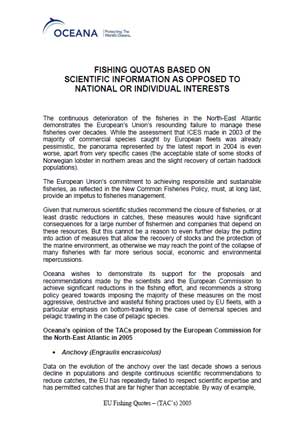Report | May 31, 2010
Fishing quotas based on scientific information as opposed to national or individual interests
The continuous deterioration of the fisheries in the North-East Atlantic demonstrates the European’s Union’s resounding failure to manage these fisheries over decades. While the assessment that ICES made in 2003 of the majority of commercial species caught by European fleets was already pessimistic, the panorama represented by the latest report in 2004 is even worse, apart from very specific cases (the acceptable state of some stocks of Norwegian lobster in northern areas and the slight recovery of certain haddock populations).
The European Union’s commitment to achieving responsible and sustainable fisheries, as reflected in the New Common Fisheries Policy, must, at long last, provide an impetus to fisheries management.
Given that numerous scientific studies recommend the closure of fisheries, or at least drastic reductions in catches, these measures would have significant consequences for a large number of fishermen and companies that depend on these resources. But this cannot be a reason to even further delay the putting into action of measures that allow the recovery of stocks and the protection of the marine environment, as otherwise we may reach the point of the collapse of many fisheries with far more serious social, economic and environmental repercussions.
Oceana wishes to demonstrate its support for the proposals and recommendations made by the scientists and the European Commission to achieve significant reductions in the fishing effort, and recommends a strong policy geared towards imposing the majority of these measures on the most aggressive, destructive and wasteful fishing practices used by EU fleets, with a particular emphasis on bottom-trawling in the case of demersal species and pelagic trawling in the case of pelagic species.


